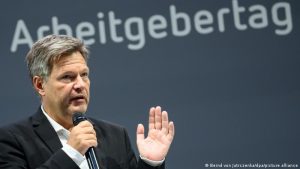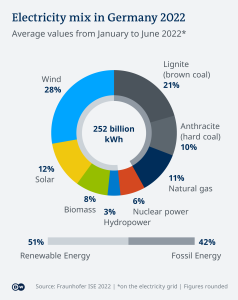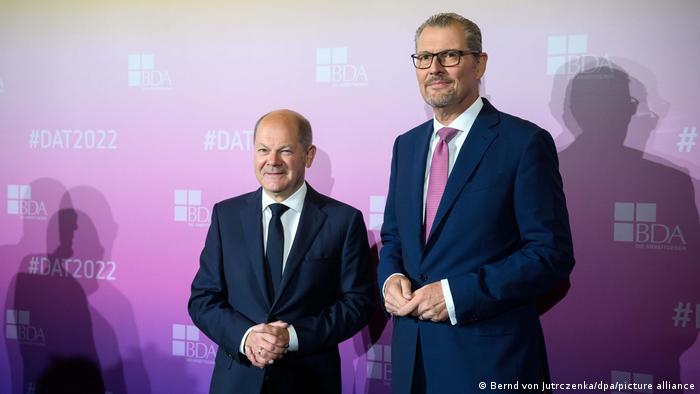A recession is looming in Germany, and the mood was tense at the Employers’ Day in Berlin. Calls for more financial aid are growing louder throughout the country.
‘A strong economy — A strong Germany” was the motto of the business conference which Chancellor Olaf Scholz also attended
Working in a T-shirt during the German winter? That used to be normal for the mechanics working at the Rosier car dealership in the northern German city of Braunschweig. Their workshop was well heated.
Sales consultants and other staff at the Mercedes dealership used to even allowed to put fan heaters under their desks in their offices if they weren’t warm enough.
But that is a thing of the past. “We can’t afford that anymore,” said Stefan Becker, who heads the dealership.
Fan heaters are to be banned and instead of 20 degrees Celsius (68 degrees Fahrenheit), the workshop will probably get no warmer than 15 degrees.
It is a sunny September morning when Becker explains his plans alongside Saskia Esken, co-chair of the ruling center-left Social Democrats (SPD), who is on her way to Lower Saxony, which faces a state election in early October.
“Gas and electricity cost us around €2 million ($2 million) more per year than before,” said Becker, as he looks through the workshop’s gate to the warm day outside.
The workshop doesn’t need heating yet but it’s only a matter of time, he said.
‘A strong economy — A strong Germany” was the motto of the business conference which Chancellor Olaf Scholz also attended
Working in a T-shirt during the German winter? That used to be normal for the mechanics working at the Rosier car dealership in the northern German city of Braunschweig. Their workshop was well heated.
Sales consultants and other staff at the Mercedes dealership used to even allowed to put fan heaters under their desks in their offices if they weren’t warm enough.
But that is a thing of the past. “We can’t afford that anymore,” said Stefan Becker, who heads the dealership.
Fan heaters are to be banned and instead of 20 degrees Celsius (68 degrees Fahrenheit), the workshop will probably get no warmer than 15 degrees.
It is a sunny September morning when Becker explains his plans alongside Saskia Esken, co-chair of the ruling center-left Social Democrats (SPD), who is on her way to Lower Saxony, which faces a state election in early October.
“Gas and electricity cost us around €2 million ($2 million) more per year than before,” said Becker, as he looks through the workshop’s gate to the warm day outside.
The workshop doesn’t need heating yet but it’s only a matter of time, he said.

Bernard Kemper’s plant produces district heating which it supplies many thousands of households in the region
“We have a dramatic economic situation, we are struggling with a rising inflation rate, immense energy prices and severe shortages of raw materials, intermediate products and other goods,” warned Rainer Dulger, president of the Confederation of German Employers’ Associations (BDA) at the German Employers’ Day held on Tuesday in Berlin.
In the business world, the mood is worsening with each passing day. The crisis caused by the coronavirus is still fresh in the memory and now a new recession seems inevitable.
It’s a paradoxical situation: Many companies have full order books but because of broken supply chains, there is a shortage of materials from all over the world.
The shortage of skilled labor is greater than ever, and energy prices are becoming unaffordable. Bakers are feeling the effects just as much as steel manufacturers or chemical companies.
If customers don’t support the price increases, manufacturers have only one option: To cut back business operations or give up production. But if a company no longer earns money, it faces insolvency.
According to surveys by trade associations, one out of three companies in Germany already believe that their existence is under threat.

Economy Minister Robert Habeck has promised support to German businesses
What will it cost to protect companies?
Production restrictions also have far-reaching consequences for other companies. There is a threat of a domino effect as chemicals and steel are basic materials that are needed everywhere.
The business community is calling for rapid assistance from the state, but with its relief packages, heating cost subsidies, increased child benefits and the 9-euro public transport ticket, the government has so far focused primarily on the population itself.
After fierce protests from businesses, Economy Minister Robert Habeck announced a expanded protection for companies as well, especially for small and medium-sized businesses and skilled trades.
But what will it cost in the event of an emergency? Triple-digit billions, like the bridging measures set up during the coronavirus pandemic? How many employees will be out of work in the winter and have to be kept afloat with short-term allowances? The Economy Ministry is still feverishly calculating the potential costs. Habeck had to concede at the Employers’ Day that there was still no agreement in the government on how much money would be available for business aid.
The government’s announcements on getting a grip on energy prices also look less concrete. Chancellor Olaf Scholz (SPD) promised quick help when it comes to power: Electricity producers that produce renewable energies and nuclear energy, which means they have no additional costs but have still been collecting high prices, are to hand over part of their so-called “windfall profits” to support poorer households and companies.
Habeck believes that a corresponding regulation could take effect from the end of the year and said it should also apply retroactively.
But the German government still doesn’t have a quick solution for gas prices.
By the end of 2023, Germany will be completely independent of Russian gas. Thanks to import terminals for liquefied petroleum gas (LPG) that are expected to be ready by then, all the gas needed can then be obtained from other countries.
The raw material will then come from Norway, the US and many other countries. Until then, it’s a matter of persevering.
“We’ll probably get through this winter, and that’s good news at this time,” said Chancellor Scholz, who doesn’t think there will be a gas shortage.

The government’s announcements on getting a grip on energy prices also look less concrete. Chancellor Olaf Scholz (SPD) promised quick help when it comes to power: Electricity producers that produce renewable energies and nuclear energy, which means they have no additional costs but have still been collecting high prices, are to hand over part of their so-called “windfall profits” to support poorer households and companies.
Habeck believes that a corresponding regulation could take effect from the end of the year and said it should also apply retroactively.
But the German government still doesn’t have a quick solution for gas prices.
By the end of 2023, Germany will be completely independent of Russian gas. Thanks to import terminals for liquefied petroleum gas (LPG) that are expected to be ready by then, all the gas needed can then be obtained from other countries.
The raw material will then come from Norway, the US and many other countries. Until then, it’s a matter of persevering.
“We’ll probably get through this winter, and that’s good news at this time,” said Chancellor Scholz, who doesn’t think there will be a gas shortage.
SOURCE:- https://www.dw.com/en/german-economy-sounds-the-alarm-over-expensive-energy-lack-of-skilled-workers/a-63107485


